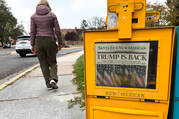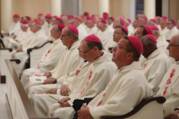Loading...
Click here if you don’t see subscription options
Click here if you don’t see subscription options

FaithFaith and Reason
Donald Trump's second term as U.S. President will surely raise significant questions about the ethics of migration policies. How might we resist extremism and polarization while retaining a commitment to the church's teaching on the dignity of all peoples?

FaithFaith and Reason
Five matters have been on my mind in the weeks since Donald Trump won the 2024 U.S. presidential election, each of them connected to my work as a moral theologian.

FaithShort Take
He might not have intended to, but Mario Cuomo paved the way for the Pilate-like indifference of so many Catholic politicians to abortion today.

FaithPodcasts
This special “Preach” episode features a panel discussion on how preachers can deliver a homily that captures the hopes of younger audiences—from toddlers to teens—while keeping the entire congregation engaged.

Politics & SocietyDispatches
Many have questioned how so many Latinos could support a candidate like DonaldTrump, who promised restrictive immigration policies. “And the answer is that, of course, Latinos are complicated people.”

Politics & SocietyShort Take
Catholic voters were a crucial part of Donald J. Trump’s re-election as president. But did misogyny and a resistance to women in power cause Catholic voters to disregard the common good?

FaithVantage Point
In 1984, then-associate editor Thomas J. Reese, S.J., explained in depth how bishops are selected—from the initial vetting process to final confirmation by the pope and the bishop himself.

FaithNews
Bishop Carlos Enrique Herrera of Jinotega was forced to leave Nicaragua after accusing a local Sandinista mayor of sacrilege for disturbing a celebration of the Mass by blaring loud music outside the cathedral, according to Nicaraguan media.

FaithFaith in Focus
I am struggling to smile and nod and accept the message from well-intentioned people, whom I love, that everything will be fine, that I should trust in God, and not despair.

Arts & CultureIdeas
Federico Fellini’s “La Dolce Vita” scandalized Italian audiences. But it was a group of Jesuit priests who were determined to offer a more nuanced interpretation of the film.
